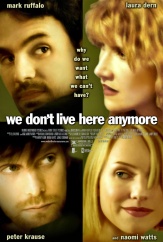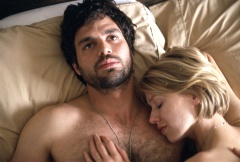| We Don't Live Here Anymore |
| |
 |
USA, 2004. Rated R. 104 minutes.
Cast: Mark Ruffalo, Laura Dern, Naomi Watts, Peter Krause, Sam Charles, Haili Page, Jennifer Bishop
Writer: Larry Gross, based on the short stories “We Don't Live Here Anymore” and “Adultery,” by Andre Dubus
Original Music: Michael Convertino
Cinematography: Maryse Alberti
Producers: Harvey Kahn, Naomi Watts, Jonas Goodman
Director: John Curran
LINKS |
And your husband making passes at my wife, how do you feel about that?
Well, everybody deserves to be happy.
--“Jack” and “Edith,” We Don't Live Here Anymore
 he late Andre Dubus had an unsettling view of humanity. Both features adapted from his short stories, In the Bedroom and the new We Don't Live Here Anymore, examine the fabric of human relationships and find little that is nurturing or warm. Yet the humanity in Dubus' flawed characters is recognizable and real. In contrast, Dubus' son Andre Dubus III wrote the novel that forms the basis of House of Sand and Fog, but there is little most people can recognize of themselves in Jennifer Connelly's vacant Kathy.
he late Andre Dubus had an unsettling view of humanity. Both features adapted from his short stories, In the Bedroom and the new We Don't Live Here Anymore, examine the fabric of human relationships and find little that is nurturing or warm. Yet the humanity in Dubus' flawed characters is recognizable and real. In contrast, Dubus' son Andre Dubus III wrote the novel that forms the basis of House of Sand and Fog, but there is little most people can recognize of themselves in Jennifer Connelly's vacant Kathy.
Despite the ugliness Dubus lays bare, he was no misanthrope. Only a truly empathic person could create the characters in In the Bedroom and We Don't Live Here Anymore—someone who genuinely loves the people he writes about. We Don't Live Here Anymore director John Curran perceives this clearly, which is why he was attracted to the material. Says Curran, “Dubus was singularly obsessed with the plight of common sinners seeking some sort of grace or sign of redemption. He wrote without judgment toward his characters. If anything he was striving for compassion or understanding.”
In the Bedroom is a look at a marriage so deadened at its core that when a couple loses their son, they cannot cope with the grief or comfort each other without taking extreme measures. We Don't Live Here Anymore deals with two much younger couples, in their mid-thirties. Emotions run closer to the surface. These marriages are reaching a turning point, but they haven't deadened, not yet.

Mark Ruffalo and Naomi Watts betray their spouses in We Don't Live Here Anymore. |
Jack Linden (Mark Ruffalo of You Can Count on Me and In the Cut) and Hank Evans (television star Peter Krause of Six Feet Under and Sports Night) are competitive best friends and college instructors in a small town. Their wives, Terry Linden (Laura Dern of Blue Velvet and Jurassic Park) and Edith Evans (Naomi Watts of Mulholland Drive and 21 Grams) are close, too, and during summer break there's not much to do other than have dinner parties, drink wine, and have an affair with your best friend's spouse. “An idle life cannot be pure,” as someone remarks in an old movie the two couples watch together.
Jack and Edith go at it first. Hank seems not to know or care enough to know, but Terry immediately detects something is wrong—in fact, she is already fighting with Jack about Edith before the affair is consummated. Their fight is the sort of epic and intimately hurtful battle than only longtime couples can have. Jack exclaims that they aren't “a couple of fucking honeymooners” anymore, while Terry retorts that other husbands touch their wives. She accuses Jack of not loving her anymore, and Jack replies that by making that statement, she makes it come true for a minute. Meanwhile, Hank tells Terry he doesn't love Edith anymore, and Jack that affairs are natural and unimportant. Hank regularly sleeps with his students.
With Jack and Terry, everything comes out. With Hank and Edith, everything is repressed. Their children become a reflection of their parents—Sharon Evans (Jennifer Bishop) is brooding and quiet, while Sean (Sam Charles) and Natasha Linden (Haili Page) are much louder and more combative. Edith is blasé about the possibility that Hank will find out about her affair, and is more concerned about Terry discovering them—but when she considers the possible effect of her affair on her daughter, her cool veneer cracks. It's after this that she wonders aloud whether she and Hank should see a marriage counsellor. “After a long, carnivorous fuck, you're talking about a marriage counsellor?” marvels Jack.
Carnivorous sex—now there's an image. Just as an animal metaphor distinguished In the Bedroom (the bedroom in the title is a lobster trap), effective animal imagery also run through We Don't Live Here Anymore. The first time Jack goes to have sex with Edith, he passes up a lobster lunch at home with Terry, and for the rest of the movie he's bringing lobsters home out of guilt. There's apes, too. Edith relates a story about a gorilla she saw at the zoo who “took a crap” in its hand and licked it—she thinks it's because he knew how trapped he was. Later, Jack mimics an ape, recalling Edith's story to the audience. Also effective is the distressed score dominated by violin and piano, with rumbling sounds providing an ominous undercurrent.
Less effective are Jack's occasional voiceovers and flashbacks—his inner emotional life is sufficiently in evidence without those techniques due to the sharp writing and Ruffalo's excellent work. With a hungry, compulsive, tender, angry, and passionate performance, this talented actor has definitely shed the shiftless stoner typecast that many associate with him from You Can Count on Me. Watts, who looks younger than the rest of the cast but isn't, is fast building a resume of extraordinary performances, and Dern, as a woman desperate to save her marriage, makes a welcome comeback after taking time off for motherhood. Krause, as the most emotionally remote character, has the easiest job, but he is in no way a weak link in the cast.
In the end, the insight offered by We Don't Live Here Anymore appears to be that if a couple still cares enough to viciously hurt each other, there might be something in the marriage left to save. Anger and hurtfulness are often an aspect of intimacy, and perhaps a necessary one to break free of stagnation, whereas if there's no passion at all—no anger or heat—then there's probably nothing left worth fighting for. That insight is driven home by the closing line of the film. Though the film is told from Hank's point of view, that line is given to Edith, and it's a sobering one.
Read the AboutFilm feature profile and interview with Mark Ruffalo.
Read the AboutFilm interviews with Naomi Watts and Laura Dern.
Review
© August 2004 by AboutFilm.Com and the author.
Images © 2004 Warner Bros. All Rights Reserved.


